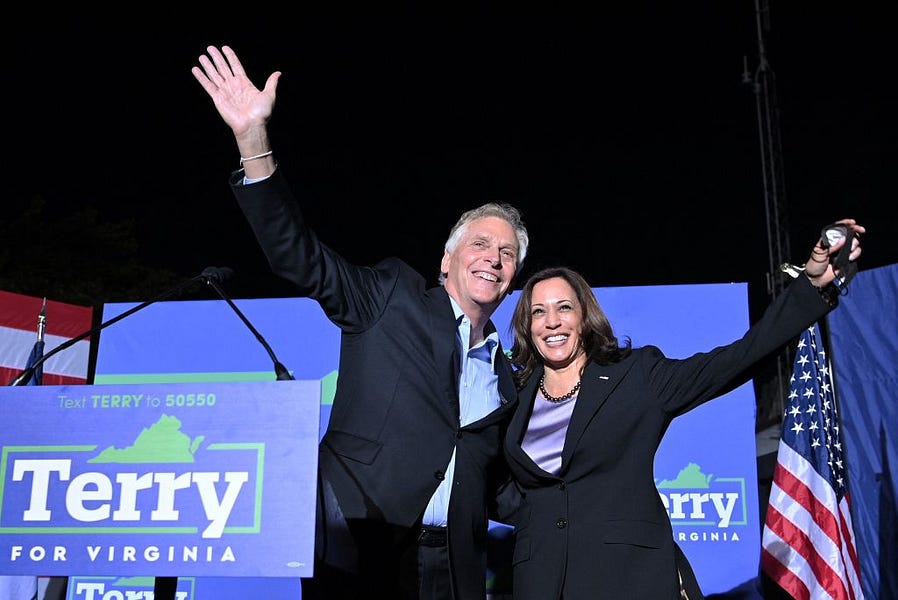Quick Hits
Everyone Has a Price: Tom LoBianco over at Vanity Fair had a juicy piece on the speaking fees that potential 2024 candidates are able to command these days.
“Mike Pence getting paid upwards of $100,000 a speech. … By comparison, other 2024 hopefuls pull down much less. Former New Jersey governor Chris Christie earns between $35,000 and $45,000 per speech, according to a speaking-industry source. The source noted that speaking fees for politicos of all stripes are down significantly in the age of Trump, when conferences and colleges are shying away from controversial figures. It’s a far cry from just a few years before Trump stormed the national stage. Former first lady, senator, and secretary of state Hillary Clinton reportedly commanded $225,000 per gig heading into the 2016 election cycle. Even Trump himself, who floated his name as a presidential contender for three decades before diving in, apparently averaged $117,000 per speech. The one exception seems to be former U.N. ambassador Nikki Haley, who previously requested a speaking fee of $200,000 and the cost of booking a private plane, according to the industry source.
I guess we’ll find out just how well the market reflects demand, right?
Something Spooky: If you’re in the D.C. area and looking for candy, look no further than the U.S. Senate. But who will have the best candy? Who will hand out raisins … or floss? Will there be a partisan divide in treats? And what can we extrapolate to the 2022 midterms? We’ll report it all here next week!

Virginia Women, Virginia Money, and Virginia Early Voting: Terry McAuliffe’s popularity is slipping among one of the most reliable Democratic voting blocs: women. According to a Monmouth poll, he’s now leading female voters by just four points (47 percent to Glenn Youngkin’s 43 percent), a drastic departure from the 14-point lead he registered with women voters in last month’s Monmouth poll. This may well be the number pundits point to after the election as proof that Youngkin’s school strategy worked—or that McAuliffe’s “I don’t think parents should be telling schools what they should teach” flub—had a real impact on the race.
Also a troubling sign for McAuliffe: Youngkin has been outraising him with Virginia donors. According to Axios, “59% of Youngkin’s cash donations are from within Virginia, while a majority (64%) of McAuliffe’s are from outside the state.” But overall, McAuliffe is outraising Youngkin. McAuliffe is quick to point out that “I have seven times more donors than he has, and mine are under $35.” That’s true … but they can’t vote for him and the in-state/out-of-state numbers are a fairly reliable stand in for voter enthusiasm.
Lastly, we do have early vote numbers to pore over. The problem is that we don’t have a great apples-to-apples election to compare them to. The last governor’s election was in 2017, but we’ve had an intervening pandemic that skewed early voting along partisan lines. So it’s hard to say whether early voting numbers that look good for McAuliffe mean that Democrats are turning out more or that the same voters are voting differently—Democrats voting early and Republicans voting on Election Day. With that in mind, here are some highlights pulled together from the Democratic data firm TargetSmart:
-
“So far, 655,297 people have voted in Virginia, compared to just 189,891 people who voted early in all of 2017.” These numbers alone show how challenging it is to infer too much here. When there’s that big a shift in how an electorate votes, you know it’s going to be hard to draw too many comparisons with the previous data set.
-
“Of the 655,297 voters, 54.6% are modeled as likely Democratic voters, compared to 30.5% who are modeled Republicans. In 2017, 48.6% of early votes cast were modeled Democratic and 42.1% were modeled Republican.” But this could all be explained by the partisan divide on early voting–i.e., Democratic voters who voted on Election Day in 2017, voted early this time whereas Republicans didn’t change their voting behavior or are slightly less likely to vote early.
-
“[T]he overall share of white voters has decreased by 4%. Interestingly, the decline in white turnout is largely from non-college educated whites.” But if the partisan modeling in the previous bullet is correct, then this is exactly what we’d expect to see. The problem is the same, though. If the difference from 2017 is caused by a partisan change in voting behavior, then looking at race or education doesn’t fix the problem.
-
“Voters ages 18-29 made up 9.7% of the electorate nine days out in 2017, compared with only 5.9% in 2021.” I include this stat because it looks bad for McAuliffe on first glance, but it’s pretty meaningless. This is their share of early voters and not the percentage of young people voting.
For more on Virginia, we go to Audrey, who is attending rallies and talking to voters so you don’t have to.
McAuliffe Campaigns Alongside Democratic Hotshots
DUMFRIES, Virginia—Vice President Kamala Harris joined Democratic gubernatorial candidate Terry McAuliffe on the campaign trail last week in Dumfries, a town of about 6,oo0 in Prince William County, Virginia’s most diverse county. “This race is tight,” Harris told a crowd of McAuliffe supporters last Thursday.
“When you elect somebody as governor, you want to make sure you really know who they are. We know who Terry is,” Harris said of McAuliffe, who served as governor of Virginia from 2014 to 2018.
Harris isn’t the only high profile Democrat who has joined McAuliffe on the campaign trail this election season: Former President Barack Obama, first lady Jill Biden, failed 2018 Georgia gubernatorial candidate Stacey Abrams, and Atlanta Mayor Keisha Lance Bottoms have also stumped for McAuliffe in recent weeks. “The McAuliffe campaign may not be bringing out the big guns unless they really need to,” said J. Miles Coleman, an elections analyst at Sabato’s Crystal Ball at the University of Virginia Center for Politics.
It’s no coincidence that four high-profile black Democrats—Harris, Obama, Abrams, and Bottoms—ended up on McAuliffe’s campaign stop shortlist. “I really think that if McAuliffe ends up losing next week, black turnout is probably going to be the main culprit,” Coleman said. McAuliffe’s campaign video featuring Kamala Harris aired in hundreds of churches across Virginia earlier this month.
Democrats know the race is close. A new survey of 816 likely voters from the GOP polling firm Cygnal published Sunday shows a tied race, with 48 percent of survey respondents favoring McAuliffe and 48 percent favoring his Republican opponent, Glenn Youngkin. A Monmouth poll released last week also suggests a neck-and-neck race, with both candidates holding “identical levels of support among registered voters” (46 percent each).
The second poll in particular is a striking development from polls Monmouth conducted in August and September, both of which showed the Democratic candidate leading by 5 points. As of Sunday, nearly 666,000 people had already voted, according to the Virginia Access Project.
Unlike McAuliffe, who will campaign with President Joe Biden in Northern Virginia later today, Youngkin will spend the rest of his 10-day, 50-stop bus tour across the commonwealth without any help from Trump, who lost the state by 10 points in 2020.
“Youngkin doesn’t really have the luxury of being able to get some big-name Republicans like that,” Coleman said. “If I’m Youngkin, I’m not going to be barnstorming this state with Donald Trump, right?” Instead of touting Trump’s endorsement, Youngkin has chosen to spend most of his events talking about his two main policy priorities: K-12 education and public safety.
McAuliffe has spent the past six months trying to undercut the notion that his Republican opponent is a moderate candidate. “Glenn Youngkin is not a reasonable Republican,” McAuliffe said at Thursday’s event. “He is a Trump acolyte who has been endorsed by Trump six times.
Die-hard Democrats are buying McAuliffe’s pitch that Youngkin’s attempt to distance himself from the former president is just a ruse. “My perception [of Youngkin] is that he is trying to run in the center, and not being true to voters telling us what he really believes, and what he really thinks, and the policies he’s really going to be bringing to Virginia,” said Richmond voter Devon Cabot at Thursday’s event. “I feel like he’s hiding who he really is.”
Cabot’s friend Kristina Hagen also said as much: “Terry has been very clear about where he stands on a lot of really important issues to Virginia voters, and we haven’t seen that same transparency [from Youngkin.]”
McAuliffe’s focus on Trump clearly resonates with a certain breed of Democratic voters who are enthusiastic enough about the race to actually attend campaign events. But it doesn’t appear to be boosting his popularity among independents.
Whereas September’s Monmouth poll showed McAuliffe leading independent voters by 9 points, this month’s Monmouth poll shows Youngkin winning independents by 9 points (48 percent McAuliffe’s 39 percent). Can McAuliffe pick up the slack with independents? Or is Virginia a blue enough state now that Democrats can win with their base voters alone?
There are a lot of important Senate races in 2022 but few will be as central to the question of whether Republicans can win back the Senate as Pennsylvania’s race to replace retiring Sen. Pat Toomey. Luckily, Ryan is breaking it down early for us.
The Race to Replace Toomey
There are still six months to go before the primary election to determine who will run for retiring Sen. Patrick Toomey’s seat, but the race so far shows that Donald Trump is still a dominating force in Republican politics and that his influence shapes candidates’ campaign strategies. The four leading candidates in terms of fundraising and publicity have all touted their ties to the former president or are running campaigns that hit on Trumpian themes.
The early frontrunners are real estate developer Jeff Bartos and Army veteran Sean Parnell, who announced in March and May, respectively. Bartos, who unsuccessfully ran to be lieutenant governor of Pennsylvania in 2020, has toed the Trump line on some issues while sticking to pocketbook issues and making President Joe Biden the main foil of his campaign. The Philadelphia Inquirer followed Bartos on a bus trip around the state earlier this year and pointed to examples of the candidate drumming up support by leaning into culture war issues and using his business acumen to make the economy the central focus.
Two other prominent candidates are Carla Sands, Trump’s ambassador to Denmark, and Kathy Barnette, a veteran and conservative commentator who appears frequently on Fox News, who hopes to become the first black Republican woman elected to the U.S. Senate.
But Parnell was seen as the favorite from the Trump camp from the beginning. A frequent Fox News guest and speaker at the 2020 Republican National Convention, Parnell narrowly lost a bid to become the congressman in Pennsylvania’s 17th Congressional District.
And Trump announced in September that he was endorsing Parnell, issuing a statement that Parnell “got robbed in his congressional run in the Crime of the Century—the 2020 Presidential Election.” In response, it didn’t take Bartos long to dig up dirt on Parnell. No less than a week after Trump announced his endorsement of Parnell, the Bartos team highlighted details of Parnell’s checkered history with women.
Bartos brought to light two temporary protection-from-abuse orders from 2017 and 2018 Parnell’s ex-wife, Laurie, took out against him. The Philadelphia Inquirer reported rumors of the orders had been floating for months, but Bartos was the first to publicize the documents. Neither order was ever extended after hearings were held, and both were ultimately expunged from Parnell’s record.
Along with the orders, Bartos pointed to sexist comments Parnell made about women on Fox News as a commentator. Bartos’ campaign called Parnell “unelectable” and said if Parnell got the nomination he would “eliminate” Republicans from holding the seat in a general election.
You can read the rest of the drama here.
And, finally, Chris is already looking past the Virginia election results to think about how Democrats may interpret them.
Virginia Squeaker Spawns Innovative Nonsense
There are a couple of main ways in which Democrats will interpret the result of Virginia’s gubernatorial election if their party loses or if it is even very close. And since the situation would be an undeniably glum augury for the party’s chances in midterms, the way in which the party internalizes a squeaker in Virginia will matter far more than the result itself.
Some Democrats will argue that even a very narrow victory by McAuliffe in Virginia is evidence that the party has to make a better case on bread-and-butter issues like ending the pandemic, bolstering the economy, fighting crime, and improving education. That argument will hold that the issues that excite progressive activists—climate change, income inequality, and social justice—are too esoteric and divisive.
Other Democrats will say that it is a lack of action on those very same issues that diminished turnout among key parts of the electorate. They will blame the nomination of McAuliffe, a self-styled moderate who is also a 64-year-old white man, instead of a candidate who could excite progressive activists.
This is easy to predict because a version of this is what happens in the wake of every significant, narrowly contested election. Motivated reasoning by members of factions within the parties guarantees that whatever the outcome, the answer will always be that had their faction been more fully obeyed the result would have been different. The same goes for wins as it does losses. If you’re a progressive Democrat, a nationalist Republican, or anything else, confirmation bias powerfully distorts your understanding of outcomes.
But it is possible to be wrong in new and interesting ways. That distinction belongs to Ron Brownstein, senior editor at The Atlantic and senior political analyst at CNN. Brownstein has long been a reliable barometer of what the conventional wisdom is in the mainstream Democratic Party. If that’s still true, then based on his new analysis of the Virginia race and its implication, Democratic elites are utterly confused.
Brownstein argues that Democrats should move quickly to resolve their disputes over the two big spending packages currently stalled in Congress—so far, so good—so that they can then make a hard pivot to—uh-oh—ditching the Senate filibuster and passing sweeping changes to election law with 51 votes. His implicit message is that progressives ought to roll over and accept less on the $3.5 trillion social-welfare spending package they seek so that they can get on to pressuring moderates to take another hack at the filibuster.
“Passing the reconciliation bill would also clear the way for passage of the extensive bipartisan infrastructure package approved earlier this year in the Senate,” says Brownstein. “And once reconciliation and infrastructure are completed, many hope Biden and other party leaders can intensify pressure on [Sens. Joe Manchin and Kyrsten Sinema] to find some way to exempt voting-rights legislation from the filibuster.”
Sweet fancy Moses.
Even aside from the fact that there’s little evidence of broad desire or need for such legislation, this is bizarre advice for Brownstein to offer Democrats. Having just concluded a bruising, divisive fight over the party’s priorities, how could it be helpful for Democrats to begin an election year by starting yet another one—one that would be charged with even more accusations of racism and apocalyptic claptrap than the current debate has been.
Brownstein approvingly quotes the floor speech of Senate Majority Leader Chuck Schumer, who likened the idea of nuking the 60-vote threshold to ram through radical changes to our election processto the passage of the Constitutional amendments abolishing slavery and granting full citizenship to freed slaves after the Civil War. “Lincoln-era congressional Republican majorities passed the major Reconstruction civil-rights laws—including the Fourteenth and Fifteenth Amendments—on an entirely party-line basis,” Brownstein writes, “without a single vote from House or Senate Democrats (who were defending their allies in the former Confederate states.)”
In the 39th Congress, which sat when the 13th Amendment was ratified, Democrats held eight of the 53 seats in the Senate and 45 of 188 seats in the House. There was no functional Democratic Party in the United States because most of the major Democratic states were not part of the union. Also, Abraham Lincoln was dead. And that doesn’t even touch on how rotten it is to compare objections to this grab-bag of election rules to the defense of legal slavery and the disenfranchisement of freedmen and freedwomen.
But it is Brownstein’s basic argument—that the correct response to political discomfort for Democrats in Virginia is for Democrats to become more intensely partisan and more factious among themselves and push more controversial legislation—that boggles the mind. The $3.5 trillion progressive package has proved to be a quagmire from which Democrats will be lucky to escape at all. Candidates in swing states and districts will have their hands full defending not just the huge amount of deficit spending but also some of the more aggressive proposals. Imagine then asking them to defend rolling back the Senate filibuster to pass a radical change to the way America conducts its elections.
And suppose further that Manchin is good to his word and refuses to go along with the irradiation of the filibuster regardless of whatever pressure Brownstein imagines the president might apply. What have you got then under this plan? Democrats who caved in on the spending fight only to walk away empty handed on the filibuster. Talk about the worst of both worlds.
If this is the stuff that passes for serious thinking inside the Democratic Party these days, it’s no wonder how a party as pitifully divided, enthralled with a one-term president, and bereft of ideas as the current GOP is still competitive.










Please note that we at The Dispatch hold ourselves, our work, and our commenters to a higher standard than other places on the internet. We welcome comments that foster genuine debate or discussion—including comments critical of us or our work—but responses that include ad hominem attacks on fellow Dispatch members or are intended to stoke fear and anger may be moderated.
You are currently using a limited time guest pass and do not have access to commenting. Consider subscribing to join the conversation.
With your membership, you only have the ability to comment on The Morning Dispatch articles. Consider upgrading to join the conversation everywhere.